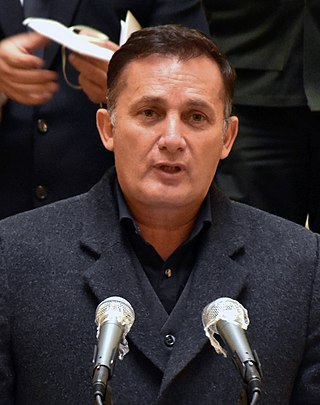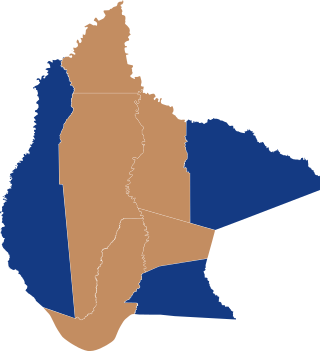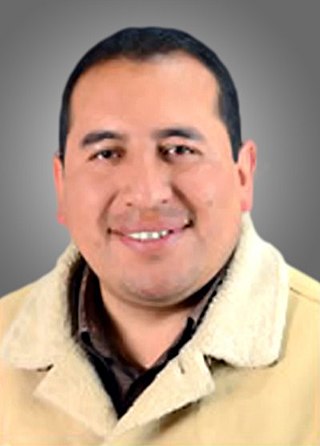
Luis Alberto Arce Catacora, often referred to as Lucho, is a Bolivian banker, economist, and politician serving as the 67th president of Bolivia since 2020. A member of the Movement for Socialism, he previously served as minister of finance—later minister of economy and public finance—from 2006 to 2017, and in 2019.

Adriana Salvatierra Arriaza is a Bolivian political scientist and politician who served as president of the Senate in 2019. A member of the Movement for Socialism, she served as senator for Santa Cruz from 2015 to 2020 and was a substitute senator for Santa Cruz under Carlos Romero in 2015. At age twenty-nine, Salvatierra was the youngest legislator and third woman to hold the presidency of the Senate and was the youngest individual to ever exert presidential authority, albeit briefly in an acting capacity.

Jeanine Áñez Chávez is a Bolivian lawyer, politician, and television presenter who served as the 66th president of Bolivia from 2019 to 2020. A former member of the Social Democratic Movement, she previously served two terms as senator for Beni from 2015 to 2019 on behalf of the Democratic Unity coalition and from 2010 to 2014 on behalf of the National Convergence alliance. During this time, she served as second vice president of the Senate from 2015 to 2016 and in 2019 and, briefly, was president of the Senate, also in 2019. Before that, she served as a uninominal member of the Constituent Assembly from Beni, representing circumscription 61 from 2006 to 2007 on behalf of the Social Democratic Power alliance.

Mónica Eva Copa Murga is a Bolivian politician, social worker, and former student leader serving as mayor of El Alto since 2021. As a member of the Movement for Socialism, she previously served as senator for La Paz from 2015 to 2020, during which time she was president of the Senate from 2019 to 2020.

Rafael Arcángel Quispe Flores, often referred to as Tata Quispe, is a Bolivian indigenous activist and politician who served as general executive director of the Indigenous Development Fund from 2019 to 2020. He previously served as a substitute party-list member of the Chamber of Deputies from La Paz under María Eugenia Calcina from 2015 to 2019.

Andrónico Rodríguez Ledezma is a Bolivian cocalero activist, political scientist, politician, and trade unionist serving as president of the Senate since 2020. A member of the Movement for Socialism, he serves as senator for Cochabamba. Rodríguez's lengthy career in the cocalero union hierarchy saw him serve as general secretary of the 21 September Workers' Center from 2015 to 2016 and as executive of the Mamoré Bulo Bulo Federation from 2016 to 2018, in addition to a multitude of other minor positions. He has served as vice president of the Coordination Committee of the Six Federations of the Tropic of Cochabamba since 2018 and held office as president of the organization from 2019 to 2020 in the absence of the body's longtime leader, Evo Morales.

Arturo Carlos Murillo Prijic is a Bolivian businessman, hotelier, and politician who served as the minister of government from 2019 to 2020. As a member of the National Unity Front, he previously served as a senator for Cochabamba from 2015 to 2019 and as a plurinominal member of the Chamber of Deputies from Cochabamba from 2006 to 2010.

Oscar Miguel Ortiz Antelo is a Bolivian businessman and politician who served as minister of economy and public finance from July to September 2020 and as minister of productive development from May to July 2020. As a member of the Social Democratic Movement, he previously served two terms as a senator for Santa Cruz from 2015 to 2020 on behalf of the Democratic Unity coalition and from 2006 to 2010 on behalf of the Social Democratic Power alliance. Nearing the end of his second term, Ortiz was his party's presidential candidate, attaining fourth place in the annulled 2019 general elections. During his first term, he served as president of the Senate from 2008 to 2010, the last opposition legislator to preside over the upper chamber as of 2024. Outside of national politics, Ortiz served as president of the Union of Latin American Parties from 2018 to 2021 and has been the rector of the Bolivian Catholic University at Santa Cruz since 2021.

Yerko Martín Núñez Negrette is a Bolivian agronomist and politician who served as minister of the presidency from 2019 to 2020. A member of the Social Democratic Movement, he previously served as minister of public works from November to December 2019. Throughout his ministerial tenure, Núñez was noted as a key person of influence in the transitional government and a "right-hand" to President Jeanine Áñez, a fellow Beni native. Prior to his appointment, he served as senator from Beni from 2015 to 2019 on behalf of the Democratic Unity coalition. As a member of Beni First, Núñez served as mayor of Rurrenabaque from 2010 to 2014; he previously held the position for two terms from 2000 to 2003 and 2005 to 2010 as part of the Revolutionary Nationalist Movement. Núñez's mayoral tenure saw strides made for Rurrenabaque's ecotourism industry, which generated increased economic growth for the city.

Luis Fernando López Julio is a Bolivian businessman, retired military officer, and politician who served as minister of defense from 2019 to 2020. Appointed in the tail end of the 2019 political crisis, López, along with Minister of Government Arturo Murillo, quickly became characterized as the "strong men" of the Jeanine Áñez administration and were implicated in the deadly events at Senkata and Sacaba. López was called to hearings by the Plurinational Legislative Assembly but failed to present himself three consecutive times, ultimately resulting in his censure by the legislature. As per the terms of the Constitution, he was dismissed as minister but, exploiting a loophole in the document's text, he was reappointed just a day later. Soon after, reports revealed his participation in the tear gas case, which accused the ministries of government and defense of irregularly purchasing non-lethal weapons at inflated prices.
Events in the year 2021 in Bolivia.

The Arce Cabinet constitutes the 222nd cabinet of the Plurinational State of Bolivia. It was formed on 9 November 2020, one day after Luis Arce was sworn in as the 67th president of Bolivia following the 2020 general election, succeeding the Áñez Cabinet. The cabinet is composed entirely of members of the ruling Movement for Socialism. Described as a "technocratic" cabinet, it has been noted for the low-profile and youth of some of its members as well as its political distance from former president Evo Morales.

Santos Quispe Quispe, commonly known as Wayna Mallku, is a Bolivian doctor and politician serving as governor of La Paz since 2021. A member of Forward United People, of which he is the leader, Quispe was a relative unknown in politics until he replaced his late father, the renowned peasant leader Felipe Quispe, as Jallalla La Paz's candidate for the governorship of the La Paz Department. Shortly after winning the election, Quispe terminated his party's pact with Jallalla, establishing a confrontational attitude with the Departmental Assembly for the duration of his term. In early 2022, he was sentenced to house arrest with the right to work after being discovered allegedly intoxicated at his office.

The 2021 Beni gubernatorial election was held on Sunday, 7 March 2021, to elect the governor of Beni, Bolivia. Alex Ferrier, the incumbent governor after the 2015 gubernatorial election but who resigned during the 2019 political crisis, ran to return to office for a second term. He was defeated by Alejandro Unzueta, who received a popular vote plurality of 41.79 percent—a margin of more than forty percent plus ten percent above the next closes competitor—allowing for a first-round victory without the need for a runoff.

María Isabel Fernández Suárez is a Bolivian journalist and politician who served as minister of communication from January to June 2020. Fernández was the final official to serve in that post, with the Ministry of Communication being abolished during her term. She subsequently served as vice minister of communication from June 2020 until the conclusion of the transitional government of Jeanine Áñez in November 2020.

Martha Yujra Apaza is a Bolivian politician and trade unionist who served as minister of cultures and tourism from 2019 to 2020. A prominent trade union leader in El Alto, Yujra was the only indigenous member of the Jeanine Áñez Cabinet and was the final official to head the Ministry of Cultures and Tourism; the institution was abolished during her term. During her tenure, Yujra's office primarily dealt with the effects of the COVID-19 pandemic on the cultural sector, devising means of alleviating the economic ramifications of quarantine measures on artisans and entertainers. She subsequently served as a counselor at the Embassy of Bolivia in Quito from July to November 2020. Prior to serving as minister, Yujra gained notoriety for her fierce opposition to the government of Evo Morales. In 2017, she led a breakaway faction of the pro-government El Alto Regional Workers' Center. As its executive secretary, Yujra aligned the union with the Bolivia Says No alliance, running unsuccessfully to represent La Paz in the Chamber of Deputies in the annulled 2019 general elections.

María Elva Pinckert Vaca is a Bolivian businesswoman, lawyer, and politician who served as minister of environment and water from 2019 to 2020. Pinckert developed her career in Santa Cruz's agro-industrial heartland, during which time she rose to key positions of regional economic and political influence, including presiding over the Montero Civic Committee and serving as vice president of the Santa Cruz Chamber of Industry and Commerce. Elected to the Montero Municipal Council as a member of the Revolutionary Nationalist Movement in 1999, Pinckert later switched to the New Republican Force, with which she won reelection. In 2009, the party promoted her to the Senate as a substitute senator under Germán Antelo. Amid the disunity brought about by the fragmentation of her parliamentary caucus, Pinckert aligned with the Social Democratic Movement, which nominated her for a full Senate seat. Elected in 2014, Pinckert held office until 2019, when she joined the Áñez administration as head of environmental and water policy. As with many former Áñez ministers, Pinckert faced judicial consequences for her collaboration with the transitional government, leading her to seek refuge in Brazil less than a year after leaving office.
The 2021 La Paz municipal election was held in La Paz, Bolivia on Sunday, 7 March 2021, involving separate contests for mayor and all eleven municipal council seats. Incumbent mayor Luis Revilla was eligible to seek a third term but declined, leaving the mayoralty an open contest. The election was won by former minister of public works Iván Arias of the alliance, who attained a near absolute majority of 49.52 percent against a field of ten other candidates. On the municipal ballot, Somos Pueblo won 48.04 percent of the vote, winning the six seats needed to exercise a simple majority on the municipal council, with the Movement for Socialism taking the remaining five seats. Revilla's party, Sovereignty and Liberty, lost both the mayoralty and all representation on the municipal council, concluding a twenty-year period of political continuity that started in 2000 with the assumption of Juan del Granado.

Wilson Pedro Santamaría Choque is a Bolivian lawyer, politician, and sociologist who served as vice minister of public security from 2019 to 2020. A graduate of the Higher University of San Andrés with extensive postgraduate studies, Santamaría entered the political field as a partisan of the National Unity Front and served as the party's municipal leader for La Paz. In 2014, he was elected as a party-list member of the Chamber of Deputies, representing the La Paz Department from 2015 to 2019.
The following is a chronology of notable events from the year 2023 in Bolivia.

















